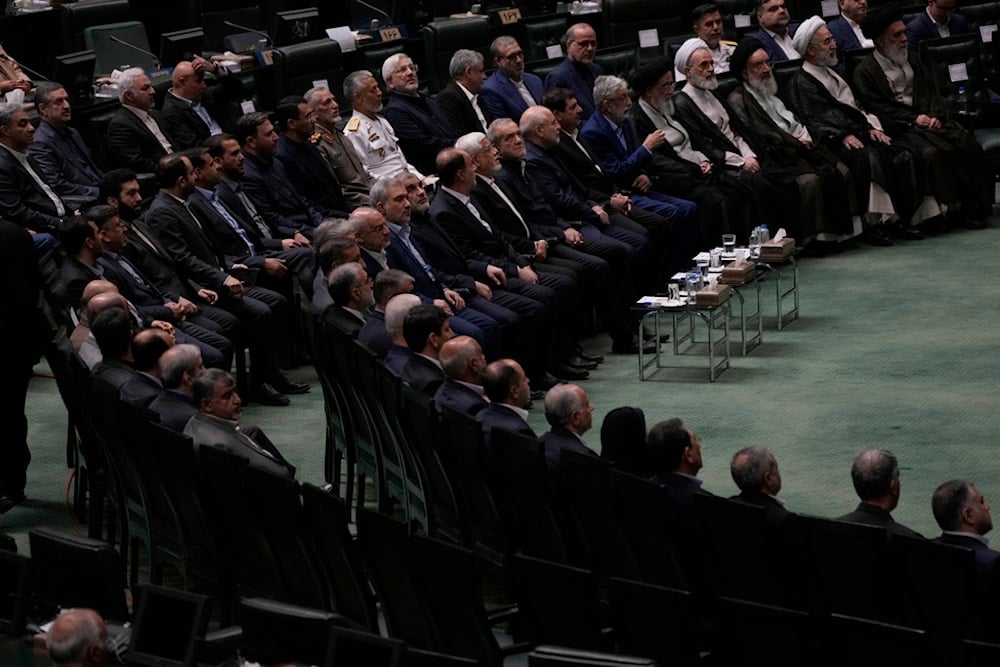Iran MP: Deterrence power halted escalation, enrichment non-negotiable
Iran’s Ali Khazarian says a few missiles caused heavy damage in “Israel,” as he urges the West to lift sanctions and accept enrichment.
-

Iranian top officials attend a memorial at the parliament in Tehran, Iran, Wednesday, May 21, 2025 (AP)
Ali Khazarian, a member of Iran’s National Security and Foreign Policy Committee in the Shura Council, stated on Friday that the unity displayed by the Iranian people during the recent Israeli attack played a decisive role in confusing the enemy.
Speaking to Al Mayadeen, Khazarian revealed that during the final days of the war, “we used only a small number of missiles, but they caused great destruction within the Zionist entity.”
He emphasized that the current calm in the region is the direct result of Iran’s ability to impose deterrence through military strength.
Khazarian warned that Tehran was operating under the assumption that the Israeli occupation might launch another attack. “We are addressing our vulnerabilities, particularly in the field of intelligence,” he said, noting that preparations are underway to counter any future assault.
He also confirmed that Iran’s message in striking the Al Udeid Air Base in Qatar was clear to all countries that host foreign military installations used to attack the Islamic Republic.
Uranium enrichment a red line
On the nuclear issue, Khazarian reaffirmed that uranium enrichment is a non-negotiable right of the Iranian nation. “Enrichment has become a national knowledge that cannot be erased,” he said, stressing that Western attempts to deprive Iran of this right have failed.
The Iranian MP added that the wave of Western messages seeking to return to the negotiating table must begin with recognition of Iran’s nuclear rights. “If there is to be a return to negotiations, we demand clear guarantees and the lifting of sanctions,” he stated.
Khazarian accused the International Atomic Energy Agency (IAEA) of politicizing its recent report on Iran. He claimed the document was approved with political intent and served as a pretext for the Israeli aggression against Iran.
Iran open to nuclear cooperation with Saudi Arabia
He revealed that when Tehran requested 20% enriched uranium to produce medical isotopes for 20,000 patients, the agency fabricated obstacles instead of cooperating.
In a significant gesture, Khazarian said that Iran is prepared to share its nuclear knowledge with Saudi Arabia. “We believe in the development and progress of the region’s countries,” he said, framing the offer as part of Tehran’s broader vision for regional integration and sovereignty free from foreign interference.
Iran open to talks, demands guarantees
Iranian Foreign Minister Abbas Araghchi has reaffirmed that Tehran remains open to renewed dialogue with the United States over the nuclear file, but only under strict conditions, including clear guarantees against military aggression and a formal commitment from Washington to mutual respect and acknowledgment of past policy failures.
In an interview with the French publication Le Monde, Araghchi emphasized that while Iran does not reject diplomacy, it requires concrete assurances before returning to the negotiating table. “We must first receive guarantees that Washington will not resort to military action during the negotiations,” he said, adding that diplomatic patience is essential in light of past experiences.
Araghchi made it clear that Iran's missile capabilities are not subject to talks. “Our missile power is a defensive and deterrent force,” he said, adding, “It is not up for negotiation under any circumstances.”
The minister’s remarks come amid renewed international focus on reviving the stalled nuclear agreement, with global powers pressing for a framework that would limit Iran’s nuclear activities in exchange for sanctions relief.

 4 Min Read
4 Min Read










